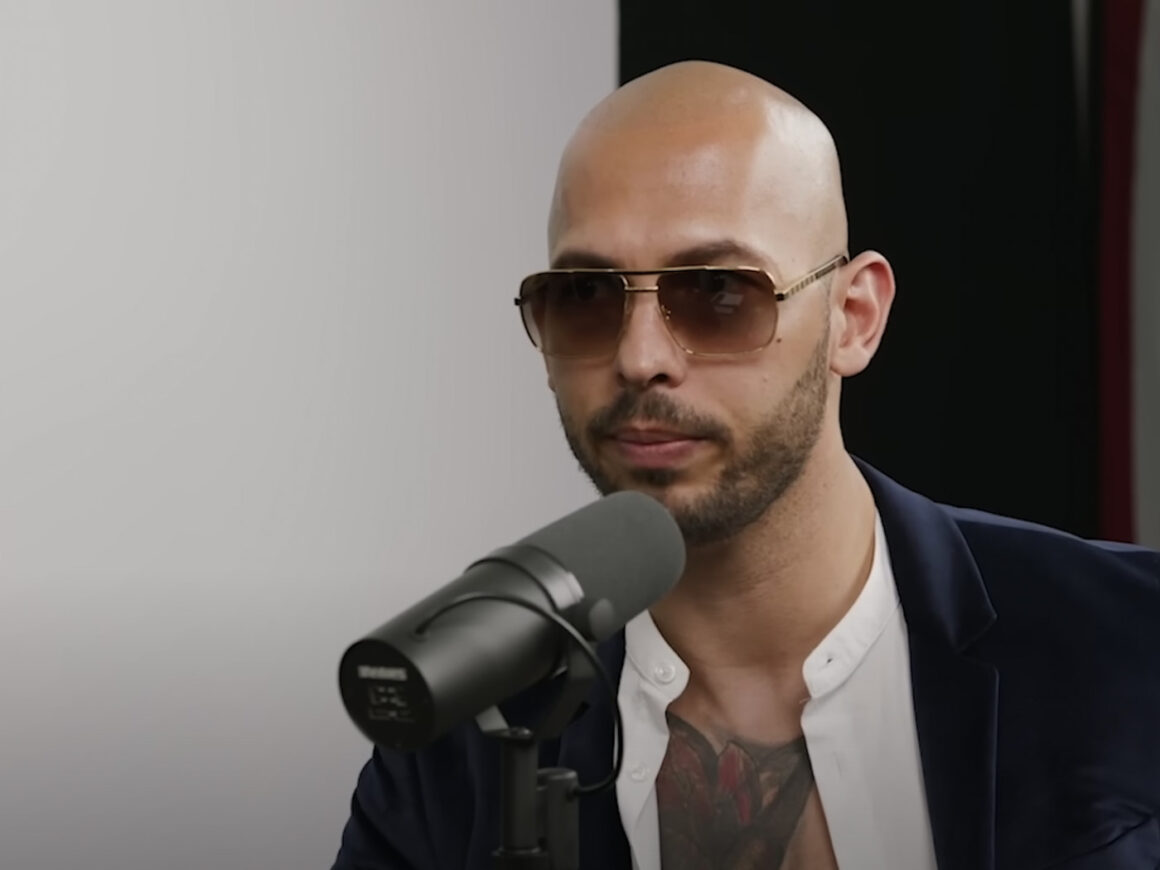The toxic ideas of Andrew Tate have gained enormous traction via various social media and online platforms – collectively known as the ‘manosphere’ – in the last year. In this article, Harper Cleves analyses Tate’s ideas and why they are intimately linked with the existing capitalist status quo.
‘What colour is your Bugatti?’
Chances are if you work with teenage boys, or have one in your household, you’ve become familiar with this question. The sarcastic quip, quoted from an Andrew Tate video, has become a symbol for young boys the world over of what hyper-masculinity could provide you: wealth, status and confidence. Even after being banned from several social media platforms in the summer of 2022, the #AndrewTate hashtag has racked up more than 22.8 billion views on TikTok. He has also amassed a following of 5.3 million on twitter.
To his supporters, Andrew Tate is the ideal of masculinity, but to millions of others he represents a dangerous backslide: a conscious antifeminism that has already had a tangible impact in schools, workplaces, and intimate relationships. What does Andrew Tate represent, and why in 2023 is he able to have such an impact?
A proud misogynist
Tate does not limit himself to bragging about expensive cars and lavish vacations. He also proudly refers to himself as a misogynist, saying that women are status symbols and the mere property of men. Women, according to Tate, belong in the home and under male control.
The logical trajectory of this messaging is the promotion of victim blaming, predatory behaviour, and outright violence towards women. Tate has said women ‘bear responsibility’ for being raped. As a 36 year-old, he expressed a preference for dating 18 and 19 year-old women because he can ‘make an imprint on them.’ He has told young men how to ‘grip her up by the neck’ and has given tips on how to stop girlfriends from going out without their permission. The conclusion young men will draw from watching these videos is that the first step on the pathway to fame and fortune is controlling the women in your life. Male dominance is the trojan horse through which a generalised capitalistic ‘fight your way to the top’ mentality is peddled to Tate’s male fanbase.
This violent misogyny is not simply empty rhetoric. Andrew Tate was arrested at the beginning of 2023 in Romania on charges of rape and human trafficking. He has been accused of forcing women to make pornographic content, after recruiting and housing them under false pretences. He also poses as a self-help guru to young men, and this has had a widely-reported impact, especially in schools where teachers often face misogynistic verbal harassment themselves but also worry about the girlfriends of the boys they teach. At a school in Wales, deputy headteacher Lisa McCall told The Guardian, ‘There seems to be an increased need for boys to control girls.'(1) A UK study of 1,200 participants demonstrated that 45% of men polled between the age of 16 and 24 viewed Tate favourably, while only 1% of girls between 16 and 17 saw him in a positive light.(2)
It is worth stating that Tate does not just espouse dangerous views on women, but on many oppressed groups. In interviews with Piers Morgan and other right-wing commentators, Tate will say he has no issues with transgender people. However, these assurances are revealed to be vacuous, often in the very next sentence out of his mouth. He has told trans and gay people to ‘leave the kids alone!’ when questioned about what he thought of Drag Queen story hours, echoing the disgusting and false anti-queer trope that gay, bi and transgender people are groomers.
Andrew Tate’s talking points promote a highly individualistic and hierarchical view of society and human nature. His assertions that wealth equals value, that poor mental health is a sign of weakness, that male supremacy is natural and correct all point to a worldview that accepts asserting your superiority at the expense of others; a way of thinking that is bolstered by division and oppression in all of its forms, including queerphobia and racism.
Tate, online misogyny & social media profiteering: A broader anti-feminist backlash
Andrew Tate is not the only source from which the gains of the feminist movement are being consciously challenged. Andrew Tate topped Google’s ‘who is’ search category for 2022. But it was Johnny Depp who was the most googled name overall last year because of the high-profile defamation case he took against his ex-partner Amber Heard.(4) Millions were spent pushing pro-Depp content on social media platforms where it became popular for users to mock Amber Heard’s tearful recollections of abuse. This trial was belatedly recognised by leading feminist organisations and gender violence experts as a conscious victim blaming campaign and a backlash against the #metoo movement.
New studies have also come out that demonstrate how young people are exposed to online misogyny, including violent pornography, at increasingly young ages. A youth worker in Dublin said boys as young as seven are beginning to quote Tate, a sentiment that is similarly reflected in anecdotal reports from the UK and the US.(3) A report by the children’s commissioner for England has shown that one in ten children have been exposed to pornography by the time they turn nine years old. Nearly 80% of young people have seen violent pornography by the time they are 18, with 33% of these actively seeking violent content. It is no surprise then that almost half of the 16 to 21 year-olds that took part in the survey assumed girls either expect or enjoy sex that involves aggression, including choking.(4)
Many young people see their first pornographic content on social media websites, just as they see their first Andrew Tate, Jordan Peterson, or Ben Shapiro videos. Because social media platforms like YouTube and TikTok make money by driving engagement, they design their algorithms so that you continue to see similar content in order to keep you on the app.(5) ‘Similar content’ when it comes to Andrew Tate is not limited to ‘the manosphere.’ You might begin with a video admiring Andrew Tate’s Bugattis and end up watching videos by Tommy Robinson, a far-right English nationalist and vocal supporter of Tate’s.
So even as these massive social media companies made a big show of kicking Tate off of their platforms last year as parents, teachers, and youth workers began to express concern, they profited off of his vile content, and still do as third party accounts continue to post his videos. TikTok, Twitter, and Facebook are all willing to profit from content that popularises sexual assault, racism, and dangerous beauty standards. Profits, not people’s wellbeing, is their bottom line.
Revolutionary or reactionary
Shortly after Andrew Tate’s recent arrest, he tweeted: ‘It seems every generation’s great revolutionaries suffer from unfair imprisonment.’ In order to be a revolutionary, Tate would actually have to represent some sort of threat to the system, which he does not.
Tate often evokes the idea of ‘tradition’ to justify ideas ranging from controlling the sexuality of women, to arguing that women should stay in the home, to stating that queer people should not be allowed to raise families. In a sense, he is right – such ideas are historically rooted in class-based societies and so therefore represent a form of ‘tradition’. This, however, does not mean that misogyny or queerphobia are in any way natural or inevitable, which is what Tate is really trying to say.
In Friedrich Engels’ crucial work Origins of the Family, Private Property and the State, he outlined how it is a unique feature of class-based civilisation to rely on gender-based oppression. Pre-capitalist nomadic, hunter gatherer societies had much less distinct and rigid ideas about gender, sexuality, and gendered roles within the family. This is still visible in indigenous cultures today; many have rituals and cultural artefacts speaking to a fluidity of both sexuality and gender.(6) For example, among the Aka people of the Congo Rainforest the fathers stay within the babies’ eyesight 88% of the time, undermining conventional wisdom that women have always been the primary caregivers.(7) Hunter gatherer societies often had a gendered division of labour, but it was not hierarchical, nor was it rigid or strict, and these societies were classless: everyone had a hand in production and shared resources relatively equally amongst themselves in order to survive.
When human society began to settle and perfect farming techniques and animal domestication, men’s previous roles began to transition to becoming that of farmers and breeders, i.e. the producers of surplus wealth in society that they could trade and barter to acquire more wealth. With this ownership of surplus came class divisions, but also the social need for the patriarchal family. Wealthy male farmers now wanted to pass down their riches to their children. In order to do this, they were compelled to control the sexuality of women, so that they could be guaranteed it was their progeny who inherited their wealth. No longer could society allow sexuality, family roles, and gender to be fluid and based on the collective well-being of the group. Now society was organised around the protection of the surplus of the wealthy, and in order to protect and pass down accrued wealth, they needed to develop a rigid gender binary and strict controls on sexuality.
In ancient civilisations such as Greece and Rome, polygamy was an open practice of men, but monogamy was a legal requirement for women. Ancient Babylon punished female infidelity with death in the Hammurabi code. This does not demonstrate that the gender binary is an inherent part of human nature, but rather, that it is socially-produced in a society predicated on inequality.
Capitalism, which is the modern form of class-based society, relies on misogyny, transphobia and the patriarchal family in new ways. The Chinese state, seeing a decline in birth rates that threatens to weaken its economic position, is placing renewed emphasis on the family and quietly making it more difficult to access abortions.(13) The Republicans in the US and the Tories in the UK are attacking trans rights at every opportunity, from Don’t Say Gay bills, to Drag Bans, to blocking gender recognition bills.
These right-wing world leaders, as well as being deeply bigoted individuals, see fear-mongering as a way to detract from the idea of a united class struggle, pushing the idea that there are scarce resources and rights that different groups must compete for as a way to distract from the wealth hoarded at the top. Moreover, these parties, and all political parties that accept the logic of capitalism, fundamentally rely on the gender binary and the patriarchal family. Unpaid domestic labour, performed primarily by women within the home, is thought to make up as much as 9% of global GDP, around $11 trillion.(8)
The unpaid labour done in the home is often referred to as reproductive labour. Cleaning, feeding, childminding, caring for the elderly – all of these tasks that contribute to the daily drudgery and oppression of women allow millions of people to go to work every day to make profits for their bosses. This reproductive labour by itself isn’t directly profit-producing, including (for the most part) when it is formalised and done in the workplace. But without it, society is unable to function and therefore capitalist’s profits are cut across when feminised care sectors are not in work. We saw this during the lockdowns when schools and childcare facilities were among the first jobs forced to return to in-person work so that workers with children could also return to their own profit-producing professions.
Hope for the future: Build a socialist feminist movement now
Capitalism, with its reliance on oppression and exploitation, has caused untold suffering. However, it has also brought about one important development that laid the basis for the undermining of these gendered expectations: the introduction of women into the workplace. As women and queer people became workers, their social power increased, as did their ability to discuss, share ideas, and envision a world free from their exploitation as labourers, but also free from their oppression as women or members of the LGBTQIA+ community.
From some of the earliest strikes of women workers in garment factories to the latest feminist movements, the misogynistic and oppressive ideology of capitalism has been challenged by those who stand to gain the most from its overthrow. The global feminist wave of the last decade has put victim blaming, attacks on abortion rights, racism and transphobia at the centre of its struggle and in doing so has raised the expectations of a whole generation. Ground-up struggles for LGBTQIA+ rights have created the conditions in which more young people than ever before identify as queer and are prepared to fight for a world in which they can express themselves fully.
Ni una menos and #metoo have given women the tools not only to understand dangerous dynamics in their own intimate partnerships, but also to see the roots of gender violence in the system. Black Lives Matter and other anti-racist and anti-imperialist struggles have made the idea of systemic racism a generally accepted truth. Amongst the youthful base of these movements, there is a strong sense that all struggles against oppression are interconnected, and that in order to fight for the liberation of any oppressed group, you have to fight for the liberation of all. This desire for solidarity of the exploited and oppressed is replete with potential, and if combined with an understanding that gender and racial oppression are rooted in capitalism, and if orientated towards organising for major working class struggle and unity, can be deeply powerful.
These struggles have elevated consciousness on issues of oppression to such an extent that even popularly elected far-right leaders have not been able to rule with impunity. Meloni of Italy has had to say she is not anti-abortion as a result of public pressure. The Republicans in the US lost on every ballot measure in the midterms that attempted to roll back abortion access further. Netanyahu and his far-right government in Israel are the subject of massive protests in which LGBTQIA+ rights are a key issue. Even courts and the police in the US have been forced to fire and convict killer cops as a result of the Black Lives Matter movement.
The vile rhetoric of Andrew Tate and others like him can make an impact in an environment where dissatisfaction and alienation reign, and where a template for misogyny, transphobia, and racism already exists to explain away the problems that capitalism causes. Over the past three decades, the policies of neoliberalism strove to gut the workers’ movement and aggressively pushed an ideology of individual progress, meaning that young people today have grown up in an environment where they have experienced very low levels of collective struggle. However, the reality of capitalism today has for many undermined individualism and young people have started to fight back.
From attending Black Lives Matter protests; to ordering abortion pills online for their friends; to pushing schools to conduct LGBTQIA+ training; to walking out in school strikes against climate change, gender violence, and gun culture; to now contemplating what it means to get organised in their workplaces – more and more young people are confronting the limits of the system and are increasingly looking towards sustained, left-wing activism and ideas as an avenue to fight for their futures.
Marxism, as an ideology completely unique in its ability to analyse the source of workers’ exploitation, climate destruction, racism, imperialism, and yes, the misogyny and transphobia at the core of Tate’s ideology, is becoming increasingly attractive to radical people all over the world who want to fight to end human suffering. Profiteering social media companies, politicians intent on divide and rule politics, a system that pretends to have scarce resources while hoarding wealth for the super wealthy at the top – we can end it all, if we become committed socialist activists today. We have a world to win, one in which a pathetic creep like Andrew Tate would be a cringey memory of a more primitive past.
- Sally Weale, 2 Feb 2023, ‘We see misogyny every day’: how Andrew Tate’s twisted ideology infiltrated British schools’,www.theguardian.com
- 2 Maya Oppenheim, 16 Feb 2023, ‘Figures that lay bare the shocking scale of toxic influencer Andrew Tate’s reach among young men’, www.independent.co.uk
- Neasa Cumiskey, ‘Irish youth workers‘concerned’over Andrew Tate’s influence on young boys’, www.sundayworld.com
- Sally Weale, 31 Jan 2023, ‘One in 10 children‘have watched pornography by time they are nine’’, www.theguardian.com l
- Christina Newberry, 8 Feb 2023, ‘2023 TikTok Algorithm Explained + Tips to Go Viral’, www.hootsuite.com
- ‘The Indigenous Origins of Gender Fluidity’,www.globesmart.com
- Sarah Blaffer Hrdy, 2011, Mothers and Others, Cambridge: Harvard University Press
- Asia-Pacific Economic Cooperation, ‘Unpaid Care and Domestic Work: Counting the Costs’, www.apec.org












